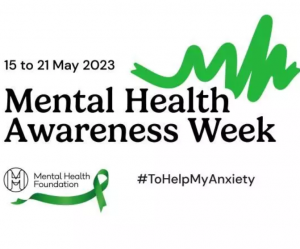
This year’s Mental Health Awareness Week starts next Monday the 15th. The focus is on anxiety, something most of us have to deal with at some point in our lives.
Here are some fantastic suggestions for dealing with anxiety from the Mental Health Foundation.
Anxiety is something we can all experience from time-to time. There are lots of reasons why we get this feeling. It can be connected to a job, school, a relationship, social situations, how we feel about ourselves, or a change in our life.
If we don’t know how to cope with our feelings of anxiety, they can get out of control and stop us from doing the things we need or want to do. The more often and the longer we feel anxious, the more it can become a problem.
Dealing with anxiety can be hard. But there are some things we can do to manage these tough feelings.
Have a read through the following suggestions and find out what might work for you.
When you’re having anxious thoughts try focusing on your breathing, concentrating on the feeling of your body as you breathe in and out. It can help you control the thought.
4-7-8 breathing technique
Close your mouth and quietly breath in through your nose, counting to four in your head. Hold your breath and count to seven. Breathe out through your mouth, making a whoosh sound while counting to eight. Repeat three more times for a total of four breath cycles.
Some people find relaxation exercises work too, while others find mindfulness useful.
Exercise is a good way of dealing with anxiety.
Remember, activity doesn’t have to be vigorous; try some gentle stretches, yoga, or seated exercises. Or just go for a walk. Going for a run, swimming, or taking part in a fitness class can give you something else to think about. It needs a bit of concentration, so takes your mind of the anxious thoughts. Any amount of exercise will help.
Read more about how exercise can help improve our mental health.
It’s important that we don’t try to ignore our worries. Taking the time to keep a record of what’s happening in your life and how it’s affecting you can help you understand what is triggering your feelings of anxiety. Knowing this can help you better prepare for and manage situations that may cause anxiety.
Sometimes it helps to give yourself a certain time of day to be your ‘worry time’. It could be half an hour first thing in the morning for to sit with your worries and write them down in your diary. When that’s out of the way, you can move on with the rest of your day. This can help you take control and stop anxiety getting in the way of what you want to do.
Anxiety can lead us to think about things over and over again in our brain. This is called ‘rumination’ and it’s not helpful. When you catch yourself ruminating try to write down the thought and to challenge it. Is what you’re worrying about likely to happen? Are you being realistic? Have you had similar thoughts which have not turned into reality? This can make it easier to challenge the thoughts and stop them from overwhelming you.
A common cause of anxiety is money. If you’re worried about not being able to pay bills, are struggling to repay debt, or aren’t sure if you
can cover your family’s living costs, seek help. Make sure you are claiming all the government supports that you’re entitled to. You can also speak to an organisation such as Citizens Advice or StepChange.
Source: the Mental Health Foundation

